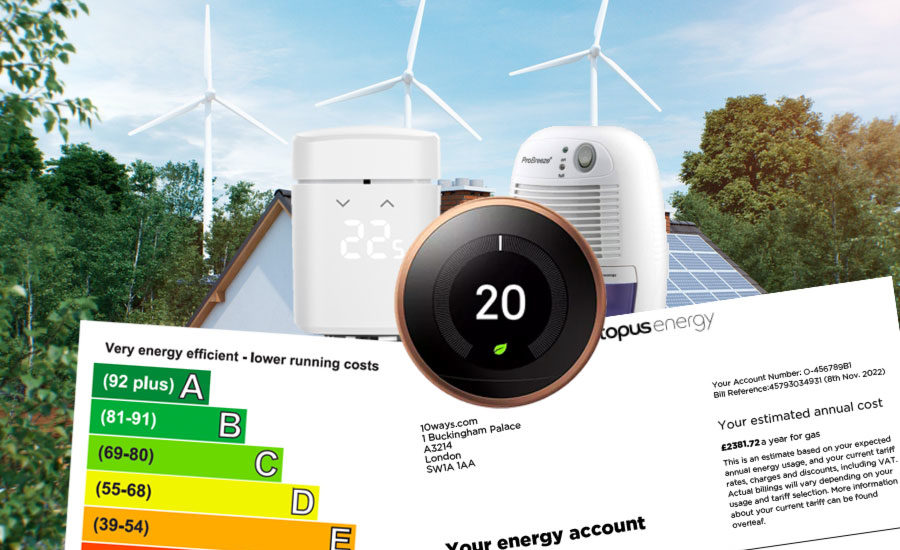Keeping your home or yourself warm
- Seal gaps around windows/doors (Caulk Gun and Caulk OR stick-on rubber/brush)
- Door Draught Excluders or make your own
- Lower the flow temp of your combi boiler to 50-60°c (check your setup here before adjusting) – This is a great way of saving ~£100+ per year if you have it set much higher
- Drop your home heating down by
- Chimney Balloon or excluder (for those with fireplaces that aren’t used often) ()
- Thermal curtains (DIY or on sites like eBay https://10ws.co/3Uz3x8z) and get into the habit of opening them up when the sun is out (for free home heating even in winter) and closing them as soon as it gets dark again.
- Install Radiator Reflectors or Tin Foil
- Install a keyhole cover
- Add a letterbox cover from eBay
- Rugs on hardfloors to keep heat from dissipating into the floor
- Loft well Insulated aim for at least 270mm – If you’re renting push the landlord to improve insulation
- Hot Water Pipes & Hot Water Tank Insulated if you have one
- Remember that condensation can be a real killer, so it’s important (even in winter to open windows at times, although make sure you’re not heating the room at the same time)
- Switch off radiators in rooms you don’t use (consider smart radiator valves if this is too much of an ask)
- Fix rotten windows/doors (https://amzn.to/3xZ94JO)
- If you work from home consider heating yourself only and not your whole house
- Thermal baselayers, socks, midlayers and outer layers. Layering is key!
- Check you’re only heating the house when people are home (you can use a smart thermostat for this)
- Move furniture away from radiators so you stop heating your sofa and not the house
- A stunning pair of slippers
- Drop your home thermostat down at least 1°c, remember 18°c is perfectly healthy for most people (children, elderly and unwell may need it closer to 21°c)
- Remember turning up your thermostat when it’s really cold won’t speed up the heating of your home, if you’re still cold try other things first and then consider adjusting the time the heating turns on.
- Remember turning off your heating can cause issues like condensation, mould growth, dangerous temperatures and burst pipes + can really hurt your mental health!
- Have friends over (more bodies = warmer house) and ask everyone to bring a dish etc so the costs are reduced, consider things like reading book club, gaming nights, TV nights, clothes swap parties, exercising together etc
- Do 30 mins of exercise per day to stay healthy and heat up
- Use radiator or fireplace fans to direct heat into the room
- Consider USB heated gloves or USB hand warmers instead of heating your whole house etc
- Have your boiler safety checked + serviced each year, yes there is a cost but having something safe and efficient is worth it
- Have sex 4-8 times per week (to keep nice and warm) 20 minutes of vigorous activity (if you can last that long) will warm you up and keep you warm for a good amount of time afterwards + a healthy body will be able to cope with the cold better.
Kitchen
- When cooking use pan lids to keep the heat in and try using a lot less water to boil/steam instead
- Check your fridge and freezer aren’t too cold (4°c for fridge and -18°c for your freezer)
- If Try and plan so you’re not defrosting food in the microwave, instead take it out and put it in the fridge for the day/night before.
- Perfectly mastering the amount of hot water needed from a kettle
- Leave the oven door open after turning it off
- Try a broom instead of a vacuum on hard floors
- Let food leftovers chill before putting them in the fridge so you don’t unnecessarily raise your fridge temperature
- See if your fridge/freezer has a ‘away’ mode and use it!
- Become a master of portion control, so you don’t end up with lots of leftovers that often end up in the bin!
- Defrost your fridge/freezers if there is build up and restock them both well as a full freezer is a happy freezer
- Become a master at stacking the dishwasher if you use one, so you can maximise the space
- When cooking consider an air fryer, slowcookers & pressure cookers instead of the full-blown oven
- Love Tea/Coffee? Boil the kettle once in the morning and use a thermos for the rest of the day (the jury is out on whether this actually produces a lower energy bill)
- Try a washing-up bowl instead of filling the whole sink when washing up, this lowers the amount of water needed
- When washing fruit or veg collect the water and use it around the house (e.g. watering plants, flushing toilet etc)
Clothes
- Try washing some clothes at 30°c
- Stop ironing things that people don’t see (e.g. pyjamas, pants, clothes you wear around the house)
- See if you can get away with not washing some clothes as often, we have one of these Bosch odour removers for jeans, suits etc
- Ditch the tumble dryer where possible &/or use airer / dehumidifier to help dry clothes cheaper
- Swap to an Air Source Heat Pump Dryer
- Use Time of Use Energy Tariffs to lower the cost
- Line dry clothes whenever possible, especially in summer, but it’s even possible in winter for a partial dry
Home Improvements / Maintenance
- Consider Solar Panels, Air Source Heat Pumps and Home Battery Storage (expensive initial outlay but they can pay dividends longterm)
- Swap to LED light bulbs
- Check the filters on washing machines, tumble dryers, vacuums etc frequently as a dirty filter means more energy wasted
- Bleed those radiators
- Considered clingfilm or other professional versions on windows for the really cold days but be careful with condensation
- Give your radiators a good clean with a duster, brush or even water!
- If your house is old look at better floor, wall/cavity and roof insulation
- Fit an aerator to your taps (some can be had for free from your water company scheme)
- Fix any leaky taps
- Underfloor heating if you’re redoing a room
Technology / Appliances
- Fit Smart Plugs on devices so you can turn them off when away from home or similar
- Switch off devices at the wall that are on standby mode
- See if your TV, Monitors and devices have a ‘Low Energy’ mode, understand what it does and enable when suitable
Bills
- Calculate any savings (or not) with moving to a time-of-use tariff (e.g. Economy 7) for instance we pay 12p/kWh overnight with Octopus Energy and for our household that works great (your household may vary)
- Install a smart meter &/or display to track your real-time costs (most energy companies will provide one installed for free)
- Double check Government support potentially available to you
- Contacted your MP pushing them to do more
- Understand that if you’re really struggling to pay your bills and you believe the only solution you have is turning off your heating/hot water there is support out there
- See if you can maximise freebies/discounts on things like a free/cheap coffee in exchange for working in a warm coffee shop once or twice per week!
- Submit meter readings, good way of ensuring you’re not massive underpaying or overpaying to avoid a shock in several months time.
- Swap away from pre-paid meters, normally these come at a premium
- Move to a direct debit as this may come with a small discount, this will also help with budgeting as in the summer period you generally over pay which helps in the winter months.
- Remember to compare the energy market every few 6-12 months (or even sooner) to ensure you’re paying a fair rate.
- If you flat share etc make sure everyone is paying their fair share, if your bills go up make sure the split is fair
- If someone has a new long-term partner that often stays in your joint house share (e.g. 3 or more days per week) consider requesting more from that person due to more showers, more washing up etc, it may sound stingy but it’s only fair.
Bathrooms
- Aim for 4 min showers instead of baths (although if you find baths relaxing your mental health is probably worth it)
- Applied for free water-saving devices
- Swap to a water-efficient shower head
- Check your bath water isn’t coming out too hot in the first place so you don’t end up mixing cold water into it, if you’ve heated it you’ve paid for that heat so don’t chill it with cold water.
- Swap your bath for a shower instead,
- Leave hot water in the bath so it heats the bathroom/rest of the house (double check this doesn’t make condensation worse though)
- Stop brushing your teeth, shaving and washing with the water still flowing from the tap
- Use cold water if you can instead of hot water
- Replace toilet cisterns with dual flush systems (to minimise water waste)
- If your shower takes a while to heat up consider collecting the cold water in a bucket, tub etc and use that around the house to water plants etc
Garden
- Use solar lights in the garden instead of mains powered
- Create a DIY solar + battery solution (or these bigger version)
- Collect rainwater from your roof to water plants, grass and indoor plants
- Position trees, shrubs etc to ensure sunlight hits your home in winter, provides shade in summer and lowers draughts
- Tall fences and/or a trellis can help lower wind hitting your home/windows and reduces draughts
- Swap gas gardens heaters to electric
- Group your plants based on their water usage, and reuse water from the kitchen and bathroom to water
- Buy drought-tolerant plants to lower their reliance on you
- Use the pressure washer sparingly they use both electricity and water
- Greenhouse heaters can be a great lifeline but remember to turn them off in summer or remove the need for them by improving insulation for winter
Others
- Speak with other household members to get them to do the above as well



![How to get sent crates of Heineken 0.0 sent to your workplace [April 24th 2020]](https://10ways.com/wp-content/uploads/2020/03/heineken-510x374.jpg)
![How Taxi Drivers Scam Tourists [Video]](https://10ways.com/wp-content/uploads/2015/05/taxi-510x374.jpg)























